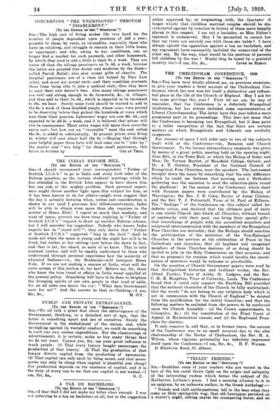THE CHELTENHAM CONFERENCE, 1910.
[To THE EDITOR OP THE " SPECTATOR."]
Si,—You have very kindly allowed me, on previous occasions, to give your readers a brief account of the Cheltenham. Conference, which has now won for itself a distinctive and influential place in the life of the Church of England. May I ask for the same privilege this year ? First let me say, by way of reminder, that the Conference is a definitely Evangelical institution, but has always included some representatives of Liberal Churchmanship. The latter have this year taken a more prominent partin its proceedings. This does not mean that the Conference is becoming less Evangelical, but it does point to a fuller recognition of the fact that there are certain matters on which Evangelicals and Liberals can cordially co-operate.
For reasons of space I will refer only to two of the subjects dealt with at the Conference—viz., Reunion and Church Government. To the former extraordinary emphasis was given by means of a great public meeting held on the opening night, June 24th, in the Town Hall, at which the Bishop of Sodor and Man; Dr. Vernon Bartlet, of Mansfield College, Oxford; and Dr. A. T. Guttery, President of the National Council of Evangelical Free Churches, were the speakers. The last-named brought down the house by remarking that the only difference which he could see between that meeting and a Methodist gathering was the omission to send the collection-plate round the platform! At the session of the Conference which dealtwith Reunion papers were contributed by the Bishop of Warrington; the Rev. J. R. Cohn, Rector of Aston Clinton; and the Rev. T. J. Pulvertaft, Vicar of St. Paul at Kilburn. The " findings " of the Conference on this subject called for definite action, and declared that the ultimate goal ofunity is one visible Church into which all Churches, without breach of continuity with their past, can bring their special gifts; that interchange of pulpits with the accredited ministers and reciprocal interoomrnunion with the members of the Evangelical Free Churches are desirable; that the Bishops should sanction the participation of the ministers of the Non-Episcopal Churches in the services at the celebration of Peace in the Cathedrals and churches; that all baptized and recognized members of those Churches desirous of so doing should be invited to join in the Holy Communion on thatoccasion; and that no proposals for reunion which would involve the reordination of ministers would be welcome or practicable.
On the question of Church Government papers were read by that distinguished historian and brilliant writer, the Rev. Alfred Fawkes, Vicar of Ashby St. Ledgers, and the Rev. C. H. K. Boughton, Vicar of Calverley, Leeds. The Conference found that it could only support the Enabling Bill provided that the national character of the Church be fully maintained; that the words "do not belong to any religious body which is not in communion with the Church of England" be deleted from the qualification for the initial franchise; and that the following matters be excluded from the powers to be conferred upon the Church Assembly : (a) the Crown appointments to bishoprics, Sacs (b) the constitution of the Final Court of Appeal in Ecclesiastical causes; and (c) the Baptismal Franchise for electors.
It only remains to add that, as in former years, the success of the Conference was in no small measure doe to the able chairmanship of the Rector of Cheltenham, the Rev. H. A. Wilson, whose vigorous personality has definitely impressed itself upon the Conference.—I am, Sir, &c., H. F. WALKER.
27 Blenheim Road, St. Albans.














































 Previous page
Previous page